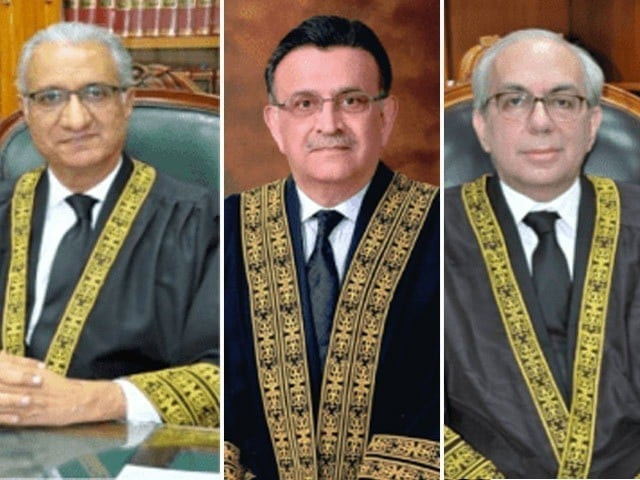Top court puts its foot down sets May 14 as date for Punjab polls
SC three-member bench declares ECP’s decision postponing provincial poll ‘unconstitutional’

The Supreme Court on Tuesday declared as “unconstitutional” the Election Commission of Pakistan’s decision to postpone election in Punjab, in a blow to the government that has been trying to delay the provincial election citing security issues and the economic crisis.
The three-member bench — headed by Chief Justice of Pakistan Umar Ata Bandial and comprising Justice Munib Akhtar and Justice Ijazul Ahsan — also fixed May 14 as the date for the poll in the province.
On March 22, the ECP delayed the provincial assembly election in the politically crucial Punjab province by more than five months, citing the deteriorating security situation in the cash-starved country, a move criticised by PTI Chairman Imran Khan.
Since his ouster last April in a no-confidence vote in parliament, Imran has been demanding early elections. Prime Minister Shahbaz Sharif has dismissed the demand and kept to elections scheduled for later this year.
The PDM government wanted national elections and the voting for the two provincial assemblies held on the same day.
“The impugned order dated 22.03.2023 made by the Election Commission of Pakistan is declared to be unconstitutional, without lawful authority or jurisdiction, void ab-initio, of no legal effect and is hereby quashed,” the ruling said.
“Neither the Constitution nor the law empowers the commission to extend the date of elections beyond the 90 days period as provided in Article 224(2) of the Constitution.”
“Elections in Punjab and Khyber Pakhtunkhwa should be transparent, impartial and as per the law,” read the verdict.
It added that the federal government should provide Rs21 billion in funds by April 10 to the ECP and directed the body to present a report on the issue by April 11.
The verdict also said that the Supreme Court will issue instructions to the authorities concerned in case the funds are not provided.
“The Punjab government should give a security plan to the Election Commission,” said the top court’s verdict. It added that Punjab’s interim cabinet and chief secretary should report to the ECP on the electoral staff by April 10.
The verdict also directed the caretaker government to assist and provide resources to the electoral body for elections in Punjab.
Referring to elections in K-P, the Supreme Court recalled that the counsel of the K-P governor had withdrawn from appearance in court “on account of a certain stand taken by a political party which [the] learned counsel was also representing”.
“The Governor, K-P province, therefore, ceased to have representation before the court,” it maintained, pointing out that the matter on the election in K-P was not adjudicated upon.
“Permission is granted to the petitioners to file such petition and/or seek such relief before such forum as is deemed appropriate.”
Heavy security was deployed outside the apex court’s building, with a large contingent of police guarding the main entrance.
Earlier in the day, the Ministry of Defence, as per the apex court's directives, had submitted its report through Attorney General of Pakistan (AGP) Mansoor Awan detailing the availability of security personnel for election duties.
After analysing the report, the top court announced its verdict and reinstated the previous schedule with amendments.
The apex court ordered returning officers to accept nomination papers until April 10, and publish the candidates' list by April 19.
The ruling further held that free and fair elections must be ensured on the new poll date.
The bench further noted that "other issues were also raised during the proceedings" and clarified that two judges had recused themselves from hearing the case.
The hearings in the case, which lasted over a week, witnessed high drama after two judges of the original five-member bench — Justices Jamal Khan Mandokhail and Aminuddin Khan — recused themselves from hearing the case. Thereafter, the chief justice constituted a bench comprising himself, Justice Ahsan and Justice Akhtar to proceed with the PTI petition.
Earlier, the government had submitted a statement through AGP Awan, requesting the formation of a full court to hear the case. It also sought dismissal of the PTI petition in light of what it interpreted as a “4-3” order issued by the apex court on March 1.



















COMMENTS
Comments are moderated and generally will be posted if they are on-topic and not abusive.
For more information, please see our Comments FAQ